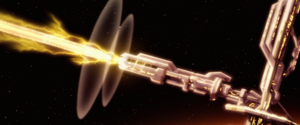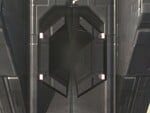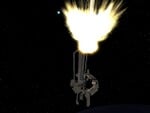Magnetic Accelerator Cannon
From Halopedia, the Halo wiki
Template:Ratings
| This article does not have enough inline citations and/or does not adhere to the proper citation format. You can help Halopedia by adding citations. |
| This article does not meet the wiki's general standards and/or standards on layouts. You can help by cleaning this article. |
- "That MAC gun can put a round clean through a Covenant Capital Ship."
- — Sergeant Johnson, talking to the Master Chief on board the Orbital Defense Platform Cairo.
The Magnetic Accelerator Cannon, also known as Mass Accelerator Cannon,[1] MAC Gun and MAC Cannon, is a large coilgun that serves as the primary offensive weapon for UNSC warships. Larger versions, nicknamed "Super" MACs or the "big stick", of these are used as orbital defense platforms. They are the only non-nuclear weapons in the UNSC arsenal capable of effectively reducing or destroying Covenant energy shields. Smaller shipborne versions can take as many as three hits to overload a shield while an orbital platform can put a hole through any Covenant vessel even with fully charged shields.
The Magnetic Accelerator Cannon should not be confused with the railgun, despite their superficial similarities.
Overview

The theory behind the operation of a Magnetic Accelerator Cannon is the same as that of a coilgun.[notes 1] The cannon fires a massive metal projectile using a linear system of magnetic fields coils down a long shaft, increasing the projectile's velocity until it carries an incredible amount of kinetic energy. The ship-based models use ferric, ferrous, or depleted uranium cores, while orbital platforms and station-based versions use ferric tungsten rounds.
Mounting
The size of a Magnetic Accelerator Cannon is such that it is normally an integral component of a warship's structure. Some types of Defense Stations are literally built around the massive weapon for orbital defense.
Ammunition
A standard ship-based MAC fires slugs of either ferric tungsten or depleted uranium at around 30,000 meters per second.[2] The high muzzle speed gives the 600-ton slug the kinetic energy and momentum necessary to damage a target and partially mitigates the unguided nature of the slug and its lack of maneuverability. Orbital Defense Platforms fire a 3,000-ton slug at nearly 50% of the speed of light, around 150,000km per second, which is capable of piercing multiple obstacles before fully stopping the projectile, if needed.
Aiming
Magnetic Accelerator Cannons are built into the superstructure of a ship or weapons platform, requiring that it maneuver in order to aim the weapon. Shipboard versions generally require an AI to aim the cannon, as the projectiles are unguided. Orbital platforms have dedicated targeting computers.
Firing
The firing process uses electromagnetism to fire a ferromagnetic-tungsten slug at high velocity. An extremely large amount of current is put through the first solenoid (coil of conducting wire) which creates a strong magnetic field which attracts the metal slug. As the slug passes into the solenoid, the solenoid is quickly turned off and the second solenoid, which is further up, turns on, which attracts the now high velocity metal slug just like the first solenoid, and the process is carried on. By the time the slug is fired out the end of the barrel it has been accelerated to a speed of approximately 30 kilometers per second for ship-based MAC and around 150,000 kilometers per second for "Super" MAC. At the same time, a pair of thrusters on the bottom side of the station fire for a couple of seconds to counteract the acceleration imparted to the station. It normally takes five seconds to recharge the capacitors as well as load the slug, which is why boarding craft have to be deployed to take the stations out.
Types
Standard Magnetic Accelerator Cannon
The standard ship-mounted MAC fires a 600-ton ferric-tungsten projectile with a depleted uranium core at 30 kilometers per second. The large amount of energy needed to fire the weapon is particularly onerous on a warship, and the extended recharge time is a significant factor in combat against Covenant warships as multiple MAC rounds are required to penetrate Covenant shields. At 270 Terajoules per shot a single ship base MAC round can destroy all but the largest and most powerful UNSC ships in one shot.
Shipborne MAC draw power from the ship's reactor and require a charge of the weapon's magnetic coils in order to be fired. According to Halo: the Fall of Reach it takes three shots from the standard MAC cannon to effectively lower the shields of a covenant ship and destroy it. The time it takes to bring the MAC's systems to full charge on a UNSC vessel is the deciding force in a conflict. Thus, while a vessel may not run out of ammunition for a long time (depending on the size/weight of the shots and the capacity of the ship), a captain or commander has to carefully analyze the situation of a battle and use his shots strategically. The weapon can be fired even when not at full charge, but the range and velocity of the projectile is greatly diminished.
An average UNSC frigate sports one MAC system, while a standard destroyer may possess two. UNSC cruisers carry two and UNSC carriers carry an unknown number of these powerful projectile weapons.
Modified MAC
When the UNSC ship Pillar of Autumn was refitted for the war against the Covenant, it received the latest version of the ship-based MAC weaponry. Magnetic field recyclers coupled with booster capacitors allowed the cannon to be fired three times per full charge, unlike traditional shipborne MAC systems, which could only fire once per charge. The Pillar of Autumn also carried new lighter MAC rounds that had a less dense ferrous core, but a harder outer layer of tungsten carbide. This technology is only possessed by the Pillar of Autumn and is never seen in gameplay. Also, the Pillar of Autumn's MAC charges up faster than normal UNSC MAC cannons, most likely due to the Pillar of Autumn's advanced reactor(s).

"Super" Magnetic Accelerator Cannon
- Main article: Orbital Defense Platform
A UNSC Defense Platform typically mounts larger and more powerful version of the standard Magnetic Accelerator Cannon, nicknamed "Super" MACs or the "big stick".
These cannons fire a 3000-ton ferric-tungsten round at nearly 50% the speed of light, impacting with a massive amount of relativistic kinetic energy, 33.7 zettajoules, equal to approximately 8.06 petatons of TNT. No known ship, UNSC or Covenant, has been shown to survive the impact of one of these rounds. Against Covenant shield technology, the rounds possess enough kinetic energy to punch through shields, cut through the ship, and, upon exit, still retain enough energy to cripple or destroy a second ship.
It is theorized that if a ship's armor or shields were to absorb all the kinetic energy of a super MAC round, the release of thermodynamic energy would still vaporize the ship. By receiving power from ground-based power plants, orbital platforms could achieve recharge and reload times as short as five seconds.[notes 2]
Related Technologies
M68 Gauss Cannon
- Main article: M68 Gauss Cannon
The M68 Gauss Cannon is a UNSC weapon mounted on the M12G1 Light Anti-Armor Vehicle and on the stationary as well as on stationary turrets. It utilises the same coilgun technology used in Magnetic Accelerator Cannon, but on a smaller scale.
M99 Stanchion Gauss Rifle
- Main article: Model 99 Special Application Scoped Rifle
The M99 is a man portable anti-matérial and anti-personnel special application weapon. Like the M68 Gauss Cannon, it utilizes the same coilgun technology as a MAC, only on an even smaller scale, using 5.4mm/.21 caliber rounds. Though smaller than conventional ammunition, these rounds are accelerated to speeds fast enough to travel long distances with almost no change in trajectory, punch through any obstructing materials, hit their target, and still retain significant kinetic energy.
M92 Principle Gauss Cannon
The M92 Principle Gauss Cannon is a Magnetic Accelerator Weapon that runs along the length of the Open Frame 92/Extra-Vehicular Activity.
Mass Drivers
- Main article: Mass Driver
The mass driver is a somewhat primitive United Nations Space Command orbital launch assembly designed to propel low-weight payloads into orbit, otherwise known as orbital lifting. The operating principle of the mass driver is essentially the same as that of the Magnetic Accelerator Cannon: it is a large coilgun that magnetically accelerates a package consisting of a magnetizable holder containing a payload.
While not a purpose-built weapon like the UNSC's Magnetic Accelerator Cannon, these platforms are still potent weapons of opportunity. While never formally incorporated as a weapon, mass drivers have been used at as defensive magnetic accelerator weapons at Harvest and the the Rubble.
MAC Blast
- "Use the Spirit of Fire's awesome Mass Accelerator Cannon to incinerate enemy troops."
- — In-game description.
In Halo Wars, the MAC Blast ability allows the player to use the UNSC Spirit of Fire's MAC for pinpoint orbital bombardment. It is mainly used as a support weapon to help the UNSC penetrate heavy Covenant defenses and Covenant bases, and is a potent weapon against Scarabs.
In skirmish and multiplayer, the MAC Blast can only be used if Captain Cutter is selected as the player's leader character. In the campaign, the MAC Blast is available in several missions, most notably Dome of Light, during which the player is granted access to forty MAC rounds to destroy a Covenant base.
Speculation
Other MAC Sizes
Although never explicitly elaborated upon, there may be many more different sizes of MAC weaponry based on the sizes of possible mounts. For example, one might extrapolate that a frigate would mount a smaller, less powerful cannon than a supercarrier or a Marathon-class Cruiser, if only for power management issues.
Conceivably, a 'large' ship could mount many 'small' MACs. However, the lack of such occurrences might suggest that the power of a MAC, once the mass and volume of all attendant components (i.e. capacitors) are accounted for, does not scale linearly. However destroyers and Marathon-class Cruisers are outfitted with two MAC cannons. The Pillar of Autumn had one large MAC cannon which could fire three 144 ton "shredder" rounds in succession on a single charge (see below).
Template:Conjecturalization End
Trivia
- The Magnetic Accelerator Cannon is twice mistakenly referred to as the "Mass Accelerator Cannon" in the Halo Universe - in Halo: Contact Harvest, and in Halo Wars, in which it is referred to as a "Mass Accelerated Cannon", which seems to be a simple typo as it does not make sense grammatically. It may be a confusion between the MAC and the Mass Driver, a non-military application of similar technologies.
- The colony ship-turned-warship UNSC Spirit of Fire's MAC cannon is revealed to be unable to penetrate a Citadel's shield in Halo Wars in one hit. This might be the result of a weaker, earlier version of the cannon, or that the shield is very powerful. Another possibility is that since its MAC gun was designed for ground support and not ship-to-ship engagements, it may fire lighter MAC rounds, as normal sized rounds would be too powerful and would cause friendly casualties. This also could explain why the cannon could fire so many shots in quick succession. Alternatively, it may only be for gameplay purposes. Or most likely because the round loses its mass as it travels through the atmosphere from orbit.
- The total energy released from the impact of a MAC round fired from a UNSC Orbital Defense Platform releases a colossal 33.7 zettajoules of energy. To put this in perspective, this is about 534973320 time the energy released from the atomic bomb detonated over Hiroshima in World War II, which released a comparatively mere 63 terajoules of energy.
Gallery
Three UNSC Frigates unleashing their MAC rounds on the Forerunner Dreadnought over the Forerunner Structure.
- Halo3 - FrigateAssault.png
MAC charges exploding over the Dreadnought, to little effect.
- Navesota.jpg
The front view of a UNSC Frigate's MAC cannon.
- PoAed.JPG
MAC muzzle of the UNSC Pillar of Autumn.
- POA-MAC Schematic.jpg
An overlay of the Pillar of Autumn and its possible MAC position.
Nassau Station firing its MAC.
- MAC - Bombardment.jpg
A MAC round impacting a planetary surface.
Appearances
Notes
- ^ A coilgun (not to be confused with a railgun) is a type of cannon which uses one or more electromagnetic coils to accelerate a magnetic projectile to high velocity.
- ^
Using KE=½mv^2 formula, The amount of kinetic energy from a regular MAC round weighing 600 tons (600,000kg) and traveling at 30 000m/s:
, 2.7 1014J of energy is released. (270,000,000,000,000J). In contrast, the Super MAC, firing the 3,000 ton (3,000,000kg) slug at 50% the speed of light (149,896,229ms-1) releases:3.37 1022J of energy. (33,703,319,202,630,661,500,000J)
Sources
- ^ Halo: Contact Harvest, page 119
- ^ Halo: The Fall of Reach, page 108




